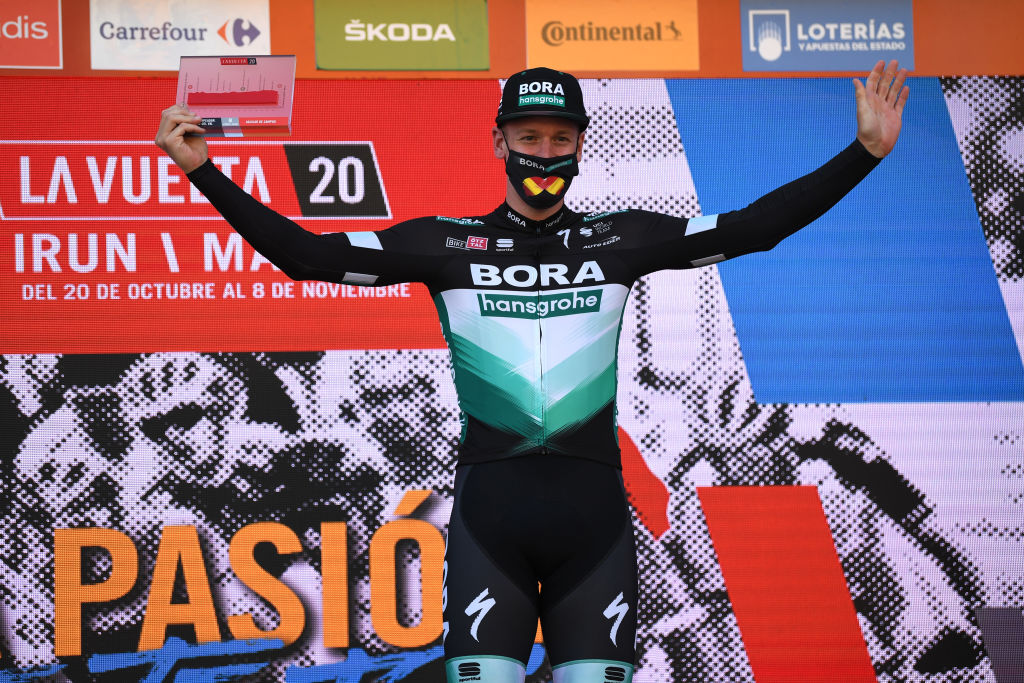Ackermann promoted to first Vuelta a España victory after Bennett disqualification
German says spate of crashes are indirectly a result of COVID-19-induced economic tension

Sprint ace Pascal Ackermann (Bora-Hansgrohe) has said he agreed with the commissaires’ decision to relegate Sam Bennett (Deceuninck-QuickStep) on stage 9 of the Vuelta a España that saw the Irishman pushed back to 110th and Ackermann moved up from second to first.
Bennett finished around a bike wheel ahead of Ackermann in the bunch sprint that decided a flat stage across northern Spain to Aguilar del Campoo.
But the Irishman was then stripped of victory by the race commissaires who judged a double shoulder barge of Trek-Segafredo’s Emils Liepins in the closing kilometre was excessive.
Promoted to first place after a half hour wait at the finish, Ackermann - himself recently relegated at Scheldeprijs for a dubious manoeuvre, as he himself pointed out - argued that Bennett’s penalty was the right one.
"I didn't speak with other riders, but I just saw the video afterwards," Ackermann said of the incident involving his former teammate, "and Sam was two times fighting with the guy from Trek.
"I think it was just a bit too much, I think after all the crashes in the last weeks we have to take a bit more care of other riders. It was the right decision."
Asked if he thought the big recent increase in crashes was a result of overly aggressive sprinting, Ackermann said he did not think there had been an increase in dangerous racing. Rather he indirectly blamed the current economic tension in cycling brought on by the pandemic.
Get The Leadout Newsletter
The latest race content, interviews, features, reviews and expert buying guides, direct to your inbox!
"It's just more the races are getting harder and the finals are getting harder, all the riders are a bit tired in the end [of the season].
"And the situation with COVID-19 doesn't make it easier, because so many riders are without contract right now, that makes more riders [take more risks] because everyone is fighting for a job.
"I can understand if there are riders fighting a bit more in the final because every result is so important this year. And that's why maybe it's a bit more dangerous because of how riders ride, it's more the situation right now."
As for the Bennett incident, the 26-year-old pointed out to what he claimed was a historical precedent "some years ago" involving Caleb Ewan (Lotto-Soudal) - presumably referring to when the Australian tangled with fellow-sprinter Jasper Philipsen (UAE Team Emirates) in the finale of stage five of the Santos Tour Down Under in 2019. Ewan won the stage but then was relegated and fined.
At the time of the incident, Cyclingnews reported that "Ewan came from a long way back in the final sprint, and appeared to go shoulder-to-shoulder with Philipsen – and to use his head – to get on Peter Sagan's wheel, before bursting clear of the Bora-Hansgrohe rider's wheel to finish first on the stage, with Philipsen finishing second and Sagan third across the line."
Ewan later said in a statement from his team, that "during the final kilometres, I was on Peter Sagan's wheel, but Philipsen tried to take that spot as he tried to push me out of Sagan's wheel.
"You are not allowed to take your hands off the handlebars in the sprint, so I used my head to avoid ending up in the barriers. Head movements are of course clearly visible on a helicopter shot, but a lot of former sprinters will confirm that my manoeuvre was not irregular."
Fourth in the Vuelta's only previous bunch sprint of the last week, where Sam Bennett won, the Vuelta victory is Ackermann's first since he took two stages of Tirreno-Adriatico as well as the points jersey, and is his seventh of the 2020 season.
Ackermann confirmed he was happy to take a win given the extremely limited number of opportunities on offer for the fastmen in this year's Vuelta.
"I think tomorrow [stage 10] is a very interesting stage because it might be a sprint or a breakaway finish but now we are more and more motivated and we are going to try again tomorrow."
"But after that, there's only Madrid, so I'm very happy that I've won a stage."
Alasdair Fotheringham has been reporting on cycling since 1991. He has covered every Tour de France since 1992 bar one, as well as numerous other bike races of all shapes and sizes, ranging from the Olympic Games in 2008 to the now sadly defunct Subida a Urkiola hill climb in Spain. As well as working for Cyclingnews, he has also written for The Independent, The Guardian, ProCycling, The Express and Reuters.
